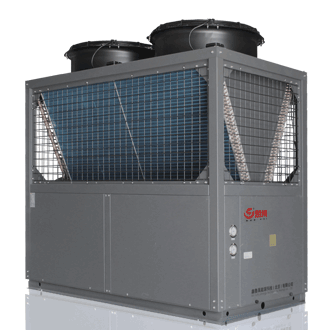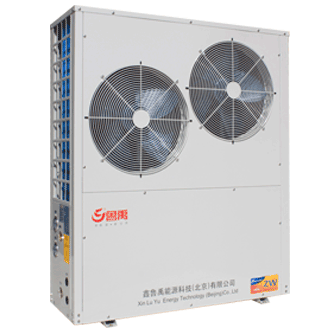推薦產(chǎn)品
歐洲空氣源熱泵采暖制冷技術(shù)應(yīng)用概況
自然能源的充分利用,可以說是主要體現(xiàn)在“上”、“中”、“下”三個(gè)方面:所謂“上”,就是指充分利用天上太陽的光和熱;所謂“中”,就是指充分利用空氣中蓄含的能量;所謂“下”,就是指充分利用地下土壤中蘊(yùn)藏的能量。
以經(jīng)濟(jì)、高效、節(jié)能和可持續(xù)的方式,為家庭提供暖氣,尋求一套完整的可靠的家庭加熱解決方案,是世界各國共同探索的一個(gè)課題。
歐洲是人類現(xiàn)代文明(比如,“自來水”的應(yīng)用、廁所“馬桶”的應(yīng)用、家庭小型污水初步處理“化糞池”系統(tǒng)的應(yīng)用)的發(fā)源地,現(xiàn)代歐洲的科技發(fā)展水平,代表了世界未來科技方面的一種發(fā)展趨勢。
根據(jù)歐盟內(nèi)部達(dá)成的協(xié)議,到2020年年底,歐洲的每一個(gè)新建建筑,都必須是“低能耗影響”(近零能耗建筑或者NZEB),即,能源需求非常低的建筑,無論如何,都要被“可再生能源”所覆蓋。所謂“可再生能源”(Renewable Energy),是指來自大自然的能源,取之不盡,用之不竭,會(huì)自動(dòng)再生,是相對于會(huì)窮盡的不可再生能源的一種能源,可再生能源的主要表現(xiàn)形式,有太陽能、空氣能、地?zé)崮堋L(fēng)能、潮汐能、生物質(zhì)能,等等。
世界各國(包括當(dāng)下的中國),對可再生能源的利用上,一般都會(huì)有政府方面的一些政策性補(bǔ)貼配套措施。
在屋頂、外墻、地板3大區(qū)域,采用超級(jí)保溫隔熱構(gòu)造的獨(dú)立住宅,使用“空氣源熱泵系統(tǒng)”,為冬季采暖、生活熱水提供熱量,三維立體剖解示意圖。
實(shí)際上,除了采用“空氣源熱泵系統(tǒng)”之外,往往還配套另外一種形式的采暖方式,比如,屋頂太陽能集熱系統(tǒng),或者電力加熱系統(tǒng),輔助混合使用。
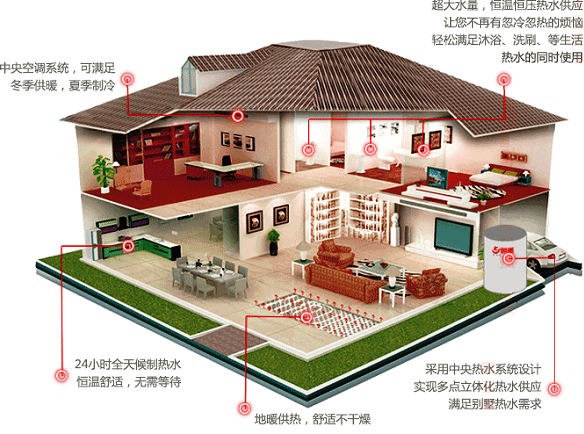
Air source heat pumps(空氣源熱泵)
Annual running costs will be significantly lower when compared to conventional methods such as gas and oil.
(與傳統(tǒng)方法(如,燃?xì)夂腿加?相比,年運(yùn)行成本將顯著降低。)
CO2 Emissions – (二氧化碳的排放量——實(shí)際上,采用空氣源熱泵系統(tǒng),比采用其它供暖形式,二氧化碳?xì)怏w的排放量,要少許多)
Simple to maintain and built with good quality materials.
(維修簡單,材料質(zhì)量好。)
The temperature provided by the heat pump is lower than conventional forms of heating such as gas and oil meaning the heat emitter must be sized correctly to ensure the building is comfortably heated.
(空氣對水熱泵提供的溫度低于傳統(tǒng)的加熱形式,如,燃?xì)饧訜岷腿加图訜幔@意味著必須正確調(diào)整散熱器的大小,以確保房產(chǎn)的加熱舒適。)
The heat pump will need to be located externally with 1.5 metres of free space in front and roughly 0.5 metres to each side.
(熱泵需要位于外部,前方1.5米的自由空間,每側(cè)大約0.5米。)
The cost depends on the size of the property and heat loss of the building.
(費(fèi)用取決于房產(chǎn)的大小和熱損失。)
The running costs also depends on these factors as well as the way you use you heating system.
(運(yùn)行成本也取決于這些因素以及您使用加熱系統(tǒng)的方式。)
You will always save money when converting to a heat pump; how much you save depends mainly on your existing fuel type.
(當(dāng)改變?yōu)闊岜脮r(shí),您將始終省錢,到底你節(jié)省了多少,這主要取決于你現(xiàn)有燃料的類型。)
To increase your savings and return on investment the following should be considered;
(為了增加你的節(jié)省和投資回報(bào),應(yīng)該考慮以下事項(xiàng):)
Heat emitter – Underfloor heating is ideal but not always possible.
(散熱器——地暖是理想的,但并不總是可能的。)
If using existing radiators they must be sized correctly.(如果使用現(xiàn)有散熱器, 則必須正確調(diào)整大小。)
Isle – eco will undertake a detailed heat loss calculation to ensure the correct capacity is installed and radiators are sized correctly.
(Isle - eco將進(jìn)行詳細(xì)的熱損失計(jì)算,以確保安裝正確的容量,并確保散熱器的尺寸正確。)
Fuel costs – Unfortunately there will still be a fuel bill to pay as the heat pump uses electricity to operate although at a much higher efficiency and lower cost.
(燃料成本 —— 不幸的是,當(dāng)熱泵使用電力運(yùn)行時(shí),仍然會(huì)有燃料費(fèi)用支付,盡管效率更高,成本更低。)
In some cases solar photovoltaic can be used to run the heat pump.
(在某些情況下,太陽能光伏發(fā)電,可以用來運(yùn)行熱泵。)
Replacing older boilers – Savings will be higher when replacing an old existing boiler as its age often reflects its efficiency.
(更換舊鍋爐——當(dāng)更換舊的鍋爐時(shí),節(jié)省的費(fèi)用會(huì)更高,因?yàn)樗睦匣37从吵鏊男省?
Controls – They way in which the heat pump is designed and controlled are important and can vary from system to system.
(控制 —— 熱泵的設(shè)計(jì)和控制方式非常重要,因系統(tǒng)而異。)
Understanding how your system is controlled will guarantee a sharper performance with more cost effective results.
(了解你的系統(tǒng)是如何控制的,將保證更清晰的性能和更具成本效益的結(jié)果。)
You can expect the system to operate effectively for 20 years providing regular maintenance is undertaken; this is also required to qualify for all warranties.
(您可以預(yù)期該系統(tǒng)有效運(yùn)作20年,提供定期維修,這也需要符合所有保修條件。)
All our clients are given an installation and maintenance handbook which should enable the end user to undertake minor maintenance works such as cleaning debris from the inlet grille and checking pressure and flow rates via gauges located on the system.
(我們的所有客戶都將得到一份安裝和維護(hù)手冊,它將使最終用戶能夠進(jìn)行一些小的維護(hù)工作,如,從入口格柵中清理雜物,以及通過系統(tǒng)上的儀表,檢查壓力和流速。)
An anti-freeze is used within the system to prevent freezing at the external unit.
(系統(tǒng)內(nèi)部使用防凍劑,以防止外部設(shè)備凍結(jié)。)
The concentration of anti-freeze will need to be monitored and changed every 3-5 years to ensure adequate protection.
(防凍劑的濃度,每隔3-5年,需要監(jiān)測和更換,以確保足夠的保護(hù)。)
Installing a ground or air source heating system will not require planning permission providing:
(安裝地源供暖系統(tǒng)或者空氣源供暖系統(tǒng),不需要提供規(guī)劃許可:)
The highest point of the installation must be no more than 2.5 meters above ground level
(安裝的最高點(diǎn)不得超過地面2.5米)
Noise emanating from an air pump must comply with the noise rating curve equivalent to the background level measured 1 meter from the boundary of the nearest residential premises.
(空氣源熱泵發(fā)出的噪音,必須符合與最近住宅區(qū)邊界1米處的背景水平相當(dāng)?shù)脑胍粼u(píng)級(jí)曲線。)
Air Source Heat Pumps Explained(空氣源熱泵說明)
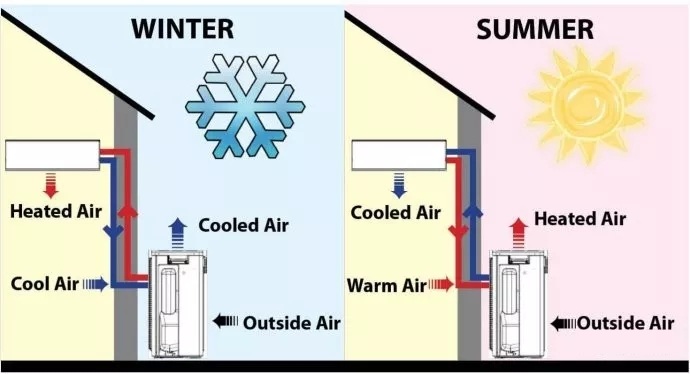
獨(dú)立住宅,空氣源熱泵,冬天(WINTER)和夏天(SUMMER),室外空氣(Outside Air)、冷空氣(Cooled Air)、熱空氣(Warm Air)的運(yùn)作,示意圖。
Heat pumps are one of the best options in the world of energy efficiency, particularly for the cold New England winters.
(熱泵是能源效率世界上最好的選擇之一,尤其是在新英格蘭寒冷的冬天。)
How Does a Heat Pump Work? (熱泵是如何工作的?)
The most basic explanation of a heat pump is that it moves warm air from one place to another.
(熱泵最基本的解釋是它把熱空氣從一個(gè)地方移動(dòng)到另一個(gè)地方。)
In the winter the refrigerant in the system absorbs heat from the cold air outside and transfers it inside your home.
(在冬季, 系統(tǒng)中的制冷劑吸收外面冷空氣中的熱量, 并把它轉(zhuǎn)移到你的家中。)
It may seem counter-intuitive to use cold air as a heat source, but heat energy is present even at very cold temperatures.
(用冷空氣作為熱源,似乎是有悖常理, 但是,即使在非常冷的溫度下, 熱能也會(huì)存在。)
In the summer the process is reversed and the pump will act as an air conditioner, absorbing the heat from within your home and transferring it outside.
(在夏季,這個(gè)過程是相反的,熱泵將作為一個(gè)空調(diào),吸收來自家里的熱量,并把它轉(zhuǎn)移到外面。)
Thanks to advancements in technology you can now install Cold Climate Heat Pump (CCHP) that function at temperatures as low as -17 degree Fahrenheit.
(由于技術(shù)的進(jìn)步,你現(xiàn)在可以安裝冷氣候功能的熱泵(CCHP),溫度可以低至華氏17度——相當(dāng)于攝氏8.3度。)
With a heat pump homeowners can expect to see anywhere from $1000-$1500 in savings.
(使用熱泵,房主可以預(yù)計(jì)從任何地方看到1000 ~ 1500美元的節(jié)省。)
If you heat with cord wood or wood pellets you can expect to see slight savings.
(如果你使用堆積垛材木柴或者是使用木質(zhì)顆粒燃料加熱,你可以看到輕微的節(jié)省。)
Homeowners with newer natural gas systems will see very little, if any savings.
(擁有較新天然氣系統(tǒng)的房主只能獲得很少的節(jié)省。)
Something worth considering is that is oil and propane prices can fluctuate significantly while electricity prices stay relatively stable.
(值得考慮的是,石油和丙烷價(jià)格可能會(huì)大幅波動(dòng),而電力價(jià)格保持相對穩(wěn)定。)
Yes! Heat pumps are two times more efficient than the average air conditioning unit and are much quieter as well.
(是的!熱泵比一般的空調(diào)機(jī)組效率高兩倍,而且也更安靜。)
Many units have smart controls, making it easy to keep temperatures in your home stable and comfortable.
(許多組成單元有智能控制,使它很容易保持在您的家庭穩(wěn)定和舒適的溫度。)
Heat pumps will also filter and dehumidify the air inside your home year-round.
(熱泵也將過濾并且除去濕氣空氣在您家全年里面。)
Alright I Want One, How Expensive Are They? (好的, 我想要一個(gè), 他們有多貴?)
The cost of installation will, on average, fall within the $3000-$8000 range.
(安裝成本平均在3000-8000美元之間。)
Not a small amount of money to be sure, however, with financing you could see savings in the first year!
(的確不是一個(gè)小數(shù)目的錢,然而,你在第一年就可以看到節(jié)省效果!)
HEAT YOUR HOME WITH AIR SOURCE HEAT PUMPS(用空氣源熱泵加熱你的家)
Heating systems designed with Air Source Heat Pump technology are flexible and more cost effective in the long term than a traditional fossil fuel boiler.
(采用空氣源熱泵技術(shù)設(shè)計(jì)的供暖系統(tǒng)比傳統(tǒng)的化石燃料鍋爐具有更大的靈活性和更高的性價(jià)比。)
If you're currently using heating oil, LPG or electric to heat your home, you could save money on your heating bills and have greater control over your heating.
(如果您目前使用的是取暖油、液化石油氣或電加熱您的家,您可以節(jié)省您的取暖費(fèi),并有更大的控制您的供暖費(fèi)用。)
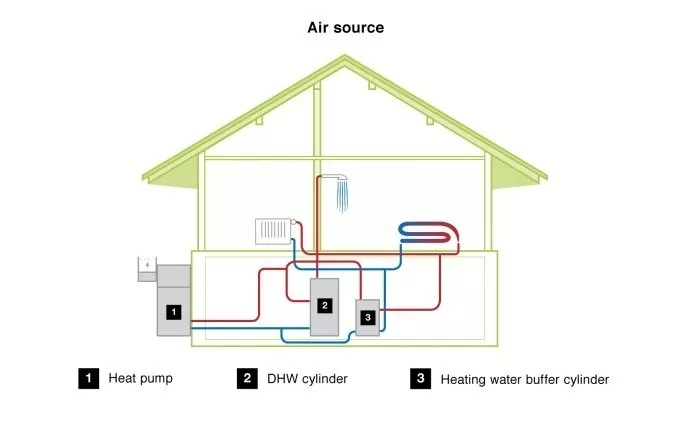
1. Heat pump(熱泵) 、2. DHW cylinder( Domestic Hot Water cylinder——生活熱水存儲(chǔ)罐)、3. Heating water buffer cylinder(供暖熱水緩沖存儲(chǔ)罐)
Air Source Heat Pumps extract heat from the air around us and if installed correctly can heat our homes when the outside temperature is as low as -15C. Working like a fridge, but in reverse, they do require some electric to produce heat, but for every unit of electric they use, they can produce up to 4.35 units of heat - so that's up to 3.35 units of free heat for your home.
(空氣源熱泵,從我們周圍的空氣中提取熱量, 如果正確安裝, 可以在室外溫度低至-15度的時(shí)候加熱我們的房屋。運(yùn)作過程,如同冰箱一樣,但是相反,他們確實(shí)需要一些電來產(chǎn)生熱量,但是他們使用的每個(gè)電力單元都可以產(chǎn)生高達(dá)4.35個(gè)單位的熱量 —— 所以這就為您的家庭提供了高達(dá)3.35個(gè)單位的免費(fèi)熱量。)
Air Source Heat Pumps live outside, so unlike a gas or biomass boiler, they don't take up any room inside your home.
(空氣源熱泵安置在室外,所以不像燃?xì)忮仩t或生物質(zhì)鍋爐那樣,它們不會(huì)占用你家里的任何空間。)
Easy to install – they don’t require as much space as Ground Source or Biomass systems and only take a few days to install.
(易于安裝 —— 它們不需要像地源熱泵系統(tǒng)或生物質(zhì)燃料鍋爐系統(tǒng)占用那么多的空間,只需要幾天的安裝時(shí)間。)
Low maintenance – they require very little maintenance and have a life span of well over 20 years.
(低維護(hù) —— 他們需要很少的維護(hù),壽命超過20年。)
Because they run at lower temperatures they are a perfect heat source for underfloor heating systems and used properly, regulate the temperature of your house more efficiently.
(因?yàn)樗鼈冊谳^低的溫度下運(yùn)行,所以它們是地板采暖系統(tǒng)的理想熱源,并且使用得當(dāng),可以更有效地調(diào)節(jié)房屋的溫度。)
采用“空氣源熱泵系統(tǒng)”,為室內(nèi)采暖以及生活熱水,提供熱量,示意圖。
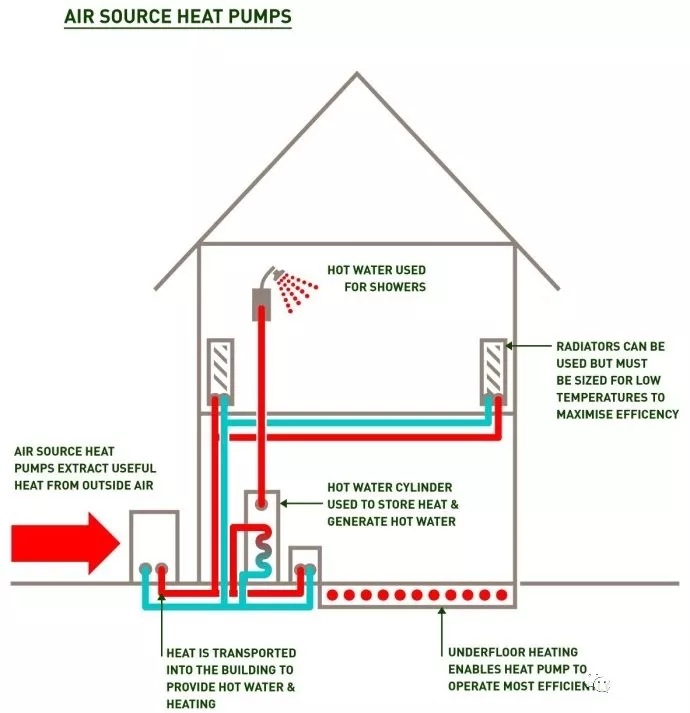
Air source heat pumps have been seen by some as a panacea, but in fact this isn't quite the case.
(一些人認(rèn)為空氣源熱泵是萬能的,但事實(shí)上情況并非如此。)
As the Energy Saving Trust’s field trials showed, the right specification is critical, and they are not suitable for all properties.
(正如節(jié)能信托的現(xiàn)場試驗(yàn)所顯示的那樣,正確的規(guī)格至關(guān)重要,并不適用于所有的房產(chǎn)。)
Key points raised by this study included the fact that new-build projects and well-insulated existing homes that are off-grid have the potential to have their running costs reduced through installing an air source heat pump.
(這項(xiàng)研究提出的關(guān)鍵點(diǎn)包括:新的建筑項(xiàng)目和遠(yuǎn)離公共資源網(wǎng)絡(luò)的良好絕緣的現(xiàn)有住宅有可能通過安裝空氣源熱泵來降低運(yùn)行成本。)
The best performance can be assured if the house is as well insulated as possible, and features low-temperature underfloor heating or over-sized radiators, as well as user-friendly controls.
(如果房屋盡可能地絕熱,則可以保證最佳的性能,并且具有低溫地暖或超大散熱器,以及人性化的控制。)
If correctly specified, an air source heat pump should be able to provide 100% of a home’s domestic hot water, but often an electric immersion heater is installed too.
(如果正確地指定,空氣源熱泵應(yīng)該能夠提供100%的家庭生活熱水,但是,往往也會(huì)有輔助電加熱器的安裝。)
They should also be advised that the air source heat pump will run for longer than a conventional boiler, but will closely match the heating requirements of the house thanks to proper controls (for maximum energy efficiency).
(還應(yīng)該告訴他們,空氣源熱泵的運(yùn)行時(shí)間比傳統(tǒng)的鍋爐要長,但是由于適當(dāng)?shù)目刂?為了獲得最大的能量效率),它將與房屋的供熱要求緊密匹配。)
There are also some financial incentives for air source heat pumps.
(對空氣源熱泵,還有一些經(jīng)濟(jì)補(bǔ)貼獎(jiǎng)勵(lì)措施。)
The Government’s Renewable Heat Incentive (RHI) has been extended to include homes, and offers a tariff to those who install certain types of renewables on their homes.
(政府的可再生能源補(bǔ)貼(RHI),已擴(kuò)展到包括安老院,并向那些在他們的家中安裝某些類型的可再生能源的人提供了免稅。)
Only some air source heat pumps on the market are registered under the Micro generation Certification Scheme (MCS), and an accredited product has to be installed by an accredited installer to qualify for the RHI payments.
(市場上只有一些空氣源熱泵在微型發(fā)電機(jī)組認(rèn)證計(jì)劃(MCS)下注冊,認(rèn)可的產(chǎn)品必須由認(rèn)可的安裝人員安裝才能獲得RHI支付資格。)
These payments only run for 7 years, but are intended to pay for the additional capital costs of the system, over and above that of a traditional heating system, during this time.
(這些補(bǔ)貼僅實(shí)行7年,但意圖在此期間支付系統(tǒng)的額外資金成本,超過傳統(tǒng)供熱系統(tǒng)的那部分成本。)
An air source heat pump can provide running cost savings for off-grid sites with no access to mains gas.
(空氣源熱泵可為遠(yuǎn)離公共資源網(wǎng)絡(luò)的場所節(jié)省運(yùn)行成本,而無需主要使用燃?xì)狻?
Specifying an air source heat pump can provide a significant improvement against Part L of the Building Regulations, due to the way that heat pumps are modelled in the calculations.
(指定空氣源熱泵可以為建筑法規(guī)的第 L 部分提供顯著的改進(jìn), 因?yàn)闊岜檬窃谟?jì)算中模擬的。)
There are however a few limitations that should be considered: (然而,應(yīng)該考慮到一些限制:)
Air source heat pumps tend to be much smaller than traditional gas boilers in terms of heat output, so it generally takes longer to heat up the hot water cylinder
(在熱量輸出方面,空氣源熱泵比傳統(tǒng)的燃?xì)忮仩t要小得多,因此熱水器的加熱通常需要較長的時(shí)間。)
Most air source heat pump systems require the installation of an external box, which can be obtrusive in terms of noise and appearance
(大多數(shù)空氣源熱泵系統(tǒng)都需要安裝一個(gè)外部的箱子,這可能是在噪音和外觀方面的突兀。)
In addition, there are a couple of other considerations that should be borne in mind:
(此外,還應(yīng)考慮到其他一些考慮因素:)
Air source heat pump efficiencies are generally stated at an external temperature of 7°C, which may not reflect the actual average efficiencies achieved during the year.
(空氣源熱泵效率通常在外部溫度為7°C時(shí)表示,這可能不能反映年內(nèi)實(shí)現(xiàn)的實(shí)際平均效率。)
During cold weather air source heat pumps can consume energy by having to defrost themselves, so may not be cost efficient during extended cold periods
(在寒冷的天氣中,空氣源熱泵可以通過自身除霜來消耗能量,因此在長時(shí)間的寒冷期間可能不具有成本效益)
What are the Benefits of Air Source Heat Pumps? (空氣源熱泵的優(yōu)點(diǎn)是什么?)
Less space is required compared to other renewable products because the main unit is located outside.
(由于主機(jī)位于外部,與其他可再生產(chǎn)品相比,需要更少的空間。)
They are generally more cost effective to install than alternative renewable heating systems.
(與替代的可再生能源供暖系統(tǒng)相比,它們通常更具成本效益。)
On a well-designed heating system with under-floor heating and an outside air temperature of 7℃, air source heat pumps can reach efficiencies of up to 5.1kW of heat for every 1kW of electricity used.
(在設(shè)計(jì)良好的地板采暖系統(tǒng)和室外空氣溫度為7度的加熱系統(tǒng)上,空氣源熱泵每使用1kW的電,可達(dá)到高達(dá)5.1kW的熱效率。)
This is known as the COP (Coefficient of Performance). Electric storage heaters have a COP of 1kW of heat to every 1kW of electricity used.
(這就是所謂的COP(性能系數(shù))。 電存儲(chǔ)式加熱器每使用1kW電,COP的功率為1kW。)
Can be used with radiators and under-floor heating systems.(可以與散熱器和地板下的加熱系統(tǒng)一起使用。)
Only 1 fuel bill is required for your home as they only require electricity to run.
(由于只需要電力運(yùn)行,您的家只需要1種燃料賬單。)
Very reliable as there are no hot burners required. (非常可靠,因?yàn)椴恍枰獰崛紵鳌?
Renewable Heat Incentive (RHI) funding available. (可再生熱激勵(lì)(RHI)資金。)
How do Air Source Heat Pumps work? (空氣源熱泵如何工作?)
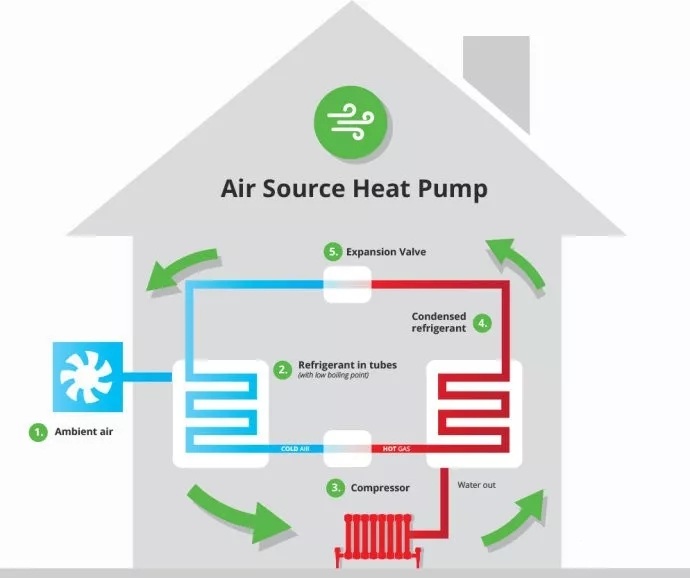
1. Ambient air(環(huán)境空氣)
Heat is extracted from the ambient air. (熱量從環(huán)境空氣中提取。)
2. Refrigerant in tubes(制冷劑在管中)
As the ambient air is pulled through the evaporator, refrigerant is circulated through the evaporator.
(當(dāng)環(huán)境空氣通過蒸發(fā)器時(shí),制冷劑通過蒸發(fā)器循環(huán)。)
3. Compressor(壓縮機(jī))
This raises the temperature of the refrigerant and turns the liquid refrigerant to gas.
(這提升了制冷劑的溫度并使液體制冷劑變成氣體。)
4. Condensed refrigerant(冷凝的制冷劑)
The hot gas is then passed through a condenser where the heat is passed onto water.
(熱氣然后通過冷凝器,在此將熱量傳遞到水上。)
5. Expansion Valve(膨脹閥)
Once the heat has been removed the hot gas turns back into a liquid to start the cycle again.
(一旦熱量被移除,熱的氣體又變回液體,重新開始循環(huán)。)
Heat pumps have been gaining in popularity in recent years due to rising energy prices and falling technology costs.
(由于能源價(jià)格上漲和技術(shù)成本下降,熱泵近年來越來越受歡迎。)
As most people probably know, a heat pump can provide a substantially greater amount of heat than the electricity it consumes simply because it just moves heat around instead of generating it.
(正如大多數(shù)人可能知道的那樣,熱泵可以提供比它所消耗的電量大得多的熱量,因?yàn)樗皇且苿?dòng)熱量而不是產(chǎn)生熱量。)
The resulting ability to operate at 200%, 300% or even higher efficiencies gives heat pumps quite a bit of cool cleantech appeal.
(由此產(chǎn)生的200%、300%,甚至更高效率的運(yùn)行能力,使得熱泵,在清潔(能源)技術(shù)方面,頗具吸引力。)
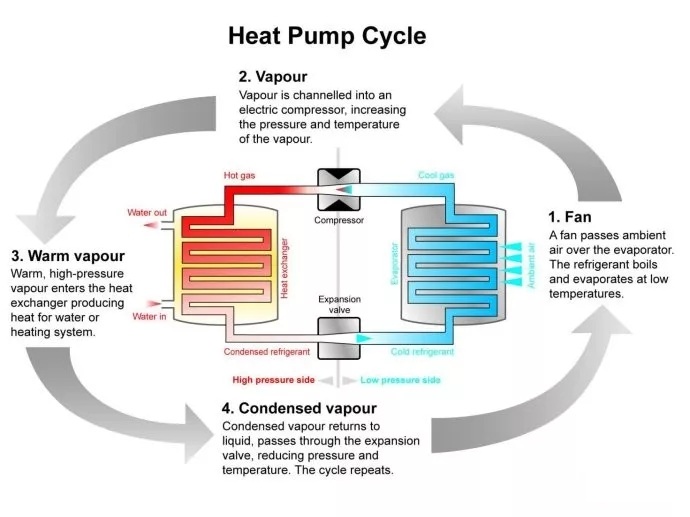
空氣源熱泵系統(tǒng)”運(yùn)行原理示意圖
Heat Pump Cycle(熱泵循環(huán))、1. Fan(風(fēng)扇)、2. Vapour(蒸汽)、3. Warm Vapour(溫暖的蒸汽)、4. Condensed vapour(冷凝蒸汽)



